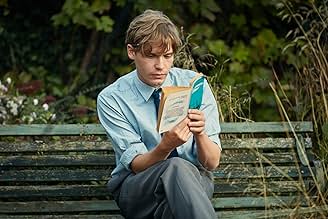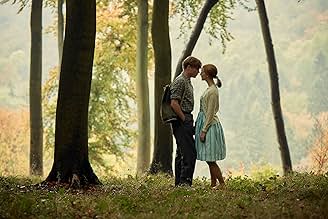AVALIAÇÃO DA IMDb
6,3/10
13 mil
SUA AVALIAÇÃO
Em 1962, a Inglaterra, um jovem casal encontra o seu romance idílico colidindo com questões de liberdade sexual e pressão social.Em 1962, a Inglaterra, um jovem casal encontra o seu romance idílico colidindo com questões de liberdade sexual e pressão social.Em 1962, a Inglaterra, um jovem casal encontra o seu romance idílico colidindo com questões de liberdade sexual e pressão social.
Avaliações em destaque
Set against Dorset's spectacular shingle bank of Chesil Beach (which is a bitch to walk along!) the story, set primarily in 1962, joins two newly-weds Florence (Saoirse Ronan, "Brooklyn", "Lady Bird") and Edward (Billy Howle, "Dunkirk") about to embark on the sexual adventure of their conjugation at a seaside hotel. The timing of the film is critical: 1962 really marked the watershed between the staid conservatism and goody-two-shoes-ness of the 50's and the sexual liberation of the swinging sixties. Sex before marriage was frowned upon. The problem for Florence and Edward is that sex after marriage is looking pretty unlikely too! For the inexperienced couple have more hang-ups about sex than there are pebbles on the beach.
The lead-up to their union is squirm-inducing to watch: a silent silver-service meal in their room; incompetent fumbling with zippers; shoes that refuse to come off. To prolong the agony for the viewer, we work through flashbacks of their first meeting at Oxford University and their disfunctional family lives: for Florence a bullying father and mother (Samuel West and Emily Watson) and for Edward a loving but stressed father (TV regular, Adrian Scarborough) but mentally impaired mother (Anne-Marie Duff, "Suffragette", "Before I Go To Sleep").
As Ian McEwan is known to do (as per the end of "Atonement" for example), there are a couple of clever "Oh My God" twists in the tale: one merely hinted at in flashback; another involving a record-buying child that is also unresolved but begs a massive question.
The first half of the film is undoubtedly better than the last: while the screenplay is going for the "if only" twist of films like "Sliding Doors" and "La La Land", the film over-stretches with some dodgy make-up where alternative actors would have been a far better choice. The ending still had the power to move me though.
Saoirse Ronan is magnificent: I don't think I've seen the young Irish-American in a film I didn't enjoy. Here she is back with a McEwan adaptation again and bleeds discomfort with every line of her face. Her desperate longing to talk to someone - such as the kindly probing vicar - is constantly counteracted by her shame and embarassment. Howle also holds his own well (no pun intended) but when up against the acting tour de force of Ronan he is always going to appear in second place.
A brave performance comes from Anne-Marie Duff who shines as the mentally wayward mother. The flashback where we see how she came to be that way is wholly predicatable but still manages to shock. And Duff is part of a strong ensemble cast who all do their bit.
Another star of the show for me is the photography by Sean Bobbitt ("12 Years a Slave") which portrays the windswept Dorset beach beautifully but manages to get the frame close and claustrophobic when it needs to be. Wide panoramas with characters barely on the left and right of the frame will play havoc with DVD ratios on TV, but work superbly on the big screen.
Directed by stage-director Dominic Cooke, in his movie-directing debut, this is a brave story to try to move from page to screen and while it is not without faults it is a ball-achingly sad tale that moved me. Recommended if you enjoyed the similarly sad tale of "Atonement".
The lead-up to their union is squirm-inducing to watch: a silent silver-service meal in their room; incompetent fumbling with zippers; shoes that refuse to come off. To prolong the agony for the viewer, we work through flashbacks of their first meeting at Oxford University and their disfunctional family lives: for Florence a bullying father and mother (Samuel West and Emily Watson) and for Edward a loving but stressed father (TV regular, Adrian Scarborough) but mentally impaired mother (Anne-Marie Duff, "Suffragette", "Before I Go To Sleep").
As Ian McEwan is known to do (as per the end of "Atonement" for example), there are a couple of clever "Oh My God" twists in the tale: one merely hinted at in flashback; another involving a record-buying child that is also unresolved but begs a massive question.
The first half of the film is undoubtedly better than the last: while the screenplay is going for the "if only" twist of films like "Sliding Doors" and "La La Land", the film over-stretches with some dodgy make-up where alternative actors would have been a far better choice. The ending still had the power to move me though.
Saoirse Ronan is magnificent: I don't think I've seen the young Irish-American in a film I didn't enjoy. Here she is back with a McEwan adaptation again and bleeds discomfort with every line of her face. Her desperate longing to talk to someone - such as the kindly probing vicar - is constantly counteracted by her shame and embarassment. Howle also holds his own well (no pun intended) but when up against the acting tour de force of Ronan he is always going to appear in second place.
A brave performance comes from Anne-Marie Duff who shines as the mentally wayward mother. The flashback where we see how she came to be that way is wholly predicatable but still manages to shock. And Duff is part of a strong ensemble cast who all do their bit.
Another star of the show for me is the photography by Sean Bobbitt ("12 Years a Slave") which portrays the windswept Dorset beach beautifully but manages to get the frame close and claustrophobic when it needs to be. Wide panoramas with characters barely on the left and right of the frame will play havoc with DVD ratios on TV, but work superbly on the big screen.
Directed by stage-director Dominic Cooke, in his movie-directing debut, this is a brave story to try to move from page to screen and while it is not without faults it is a ball-achingly sad tale that moved me. Recommended if you enjoyed the similarly sad tale of "Atonement".
"Little lamb,
Here I am;
Come and lick
My white neck;
Let me pull
Your soft wool;
Let me kiss
Your soft face;
Merrily, merrily we welcome in the year." William Blake, from Songs of Innocence
Set in 1962, On Chesil Beach is far from 1963 Beach Party with Frankie Avalon and other pre sexual revolution aquatic shenanigans. Chesil is a tightly-wound story of a young Brit couple, Florence (Saoirse Ronan) and Edward (Billy Howle), just married and beyond awkward on the wedding night: dangerously innocent.
It's not a comedy, for most of the film is framed by their uncertain movements as he tries to loosen her up (a major challenge) and she tries to get in the mood. Based on a novel and screenplay by the great Ian McEwan, this dramatic romance crystallizes the damaging innocence of the times and the dire need for experience.
While 21st-century easy hookup time is not ideal, the danger of being clueless about the power of sex and its mandates is palpable in this star-crossed story. Florence, an upper-middle class musician with a fledgling quartet, is both the scourge of Edward's hopes to be a successful husband and the hope for their love that tries to transcend sexuality. Mozart laces throughout to elevate Darwinian love making, reminding of the ethereal heights to which art can elevate love.
Yes, it's a beautifully melancholic romance whose future is endangered by present repressive times, a legacy those of us know well who were taught about the opposite sex by tyrannical and ignorant clericals, who had never been married and were usually virgins. So much is set on the beach with flashbacks to help us understand the demons that it is easy to see the future through the repression of the present.
Much of the movie moves through the awkward attempt at first sex, pristine by contemporary standards. Yet, that discomfort is necessary to understand the uncompromising fate of the couple and the tears that will inevitably come.
Regardless of where anyone is now, this powerful love story reminds of how deeply we are indebted to sex and how treating it casually or ignorantly inevitably leads to lives of desperation.
Although at times On Chesil beach echoes the delicacy of love in Call Me By Your Name and at others by the talk of Richard Linklater's Before series, this romance evokes the innocence of first love and the ruthlessness of experience.
Beautifully photographed by Sean Bobbitt, Chesil still owes most of its greatness to Dominic Cooke's direction, where the harshness of failed expectations is tempered by a love that transcends, but cannot denounce, sex.
"Break this heavy chain,
That does freeze my bones around!
Selfish, vain,
Eternal bane,
That free love with bondage bound." Blake, Songs of Experience
Having only watched the trailer once and not acknowledging the existence of its source material, I was going into this pretty open minded. Period romantic dramas are not exactly the reason why I wake up in the morning, nevertheless I came out of the screening feeling rather pleasant. It tells the story of a newly married couple who potentially destroy their marriage due to fears of physical intimate relations. Exploring frigidity is rather rare, particularly for a romance because sex sells apparently, and so I found myself compelled to dive into the psychological reasoning for Florence's lack of sexual endeavours. It's a deceptively rich story which has more to say beneath the surface than it does through the clean direction and excellent acting. Cooke's directorial debut offers a tantalising question: can you love someone without having physical interaction? A surprisingly relatable question. Weighing in on the emotional and tangible levels of love, McEwan (who also wrote the novel) crafts a script comprising of subtle warmth. The kind of lukewarm temperature you would feel when dipping your toes into the sea. At first, it may look like a drama shifting between the most awkward sex scene ever and flashbacks establishing the origins of their relationship, but there's more lurking underneath. It's understated. The non-linear narrative, while slightly contrived, does make the story that little bit more exciting. I appreciate the upkeep for authenticity by actually filming on Chesil Beach in Dorset. Ronan and Howle projected natural chemistry and bounced off each other well, even if the execution of some of the dialogue felt too mechanical. The epilogue however was completely unnecessary and negated the nuanced atmosphere that was created beforehand. The forced melodrama, whilst beautiful to watch, just didn't fit with the complexity of their relationship. So whilst there are some stumbles, it's constructed upon layers of pebbles to create a beautifully acted picturesque romance.
"On Chesil Beach" (R, 1:50) is a drama from first-time feature film director Dominic Cooke (known mainly for helming TV's "The Hallow Crown" and "National Theater Live: A Comedy of Errors"). The screenplay is by British writer Ian McEwan, adapting his own 2007 novella of the same name. The film stars multiple Oscar nominee Saoirse Ronan and Billy Howle - and was released one week after another literary adaptation, "The Seagull", in which the same two actors played young Russian lovers. This story follows two young Brits as they meet, fall in love and get married, focusing mainly on the wedding night.
Florence Pointing and Edward Mayhew have just been married and have arrived at a hotel at the titular beach for their honeymoon. Through an uncomfortable dinner in their room and awkward fumblings with their clothes, it becomes painfully clear that they are equally inexperienced and nervous regarding sex. As the evening slowly progresses, we see flashbacks of how their romance developed, with hints at what makes the prospect of sleeping together so uncomfortable for them - especially Florence. When things come to a head, the young marrieds have a seaside conservation which reveals much about who they are (and the era in which they live) and has very important consequences for the rest of their lives.
"On Chesil Beach" is one of the most layered and most profound movies you are likely to see in 2018. Woven in with the development of the romance, the developments on the wedding night and the repercussions of all of it are themes of sexual repression, gender roles, class differences, pride, regret, communication, forgiveness and, of course, love and marriage. Some will say that not much happens in this film, but there is still a whole lot happenING. And through it all, the considerable acting chops of the two leads (bolstered by solid performances from multiple Oscar nominee Emily Watson, Anne-Marie Duff, Samuel West, Adrian Scarborough and Bebe Cave) make the characters exceedingly sympathetic and relevant. This is a very well-done film without much action, but with plenty to show all of us. "A-"
Florence Pointing and Edward Mayhew have just been married and have arrived at a hotel at the titular beach for their honeymoon. Through an uncomfortable dinner in their room and awkward fumblings with their clothes, it becomes painfully clear that they are equally inexperienced and nervous regarding sex. As the evening slowly progresses, we see flashbacks of how their romance developed, with hints at what makes the prospect of sleeping together so uncomfortable for them - especially Florence. When things come to a head, the young marrieds have a seaside conservation which reveals much about who they are (and the era in which they live) and has very important consequences for the rest of their lives.
"On Chesil Beach" is one of the most layered and most profound movies you are likely to see in 2018. Woven in with the development of the romance, the developments on the wedding night and the repercussions of all of it are themes of sexual repression, gender roles, class differences, pride, regret, communication, forgiveness and, of course, love and marriage. Some will say that not much happens in this film, but there is still a whole lot happenING. And through it all, the considerable acting chops of the two leads (bolstered by solid performances from multiple Oscar nominee Emily Watson, Anne-Marie Duff, Samuel West, Adrian Scarborough and Bebe Cave) make the characters exceedingly sympathetic and relevant. This is a very well-done film without much action, but with plenty to show all of us. "A-"
Edward and florence have both just gotten their uni degrees. They fall in love and get married. But they have very different personalities; florence appears so strong and confident, but has her own unspoken past to deal with. Edward is still very young and innocent, and lacks florence's headstrong manner. This story is about how they handle their various issues. Edward seems to be overwhelmed by his own situation at home. Throw in a proud, stubborn streak, and his own inexperience, sexually. Like most young and foolish newlyweds, they don't really communicate properly. Anger and pride keep them both from listening and understanding. The actors do a great job, but it gets quite bleak and dark. Some beautiful scenery of dorset area. And snippets of beautiful classical music, as that is florence's profession. Directed by dominic cooke. Story by ian mcewan.
Você sabia?
- CuriosidadesExecutive Producer, Author, and Screenwriter Ian McEwan stated to an audience back in 2014 that he wanted Saoirse Ronan to play Florence Ponting.
- Erros de gravaçãoIn the tennis match between Edward and Florence's father (Geoffrey), they're either counting the games wrong or not alternating service properly. Edward begins serving at the start of the third set, so he should be serving when the game score is even. We immediately jump forward to a later game in which Geoffrey is serving. Geoffrey loses the game (for a change), and Edward announces the score as 1-4 before serving, which means he is now serving when the game score is odd.
It's also slightly off that Geoffrey starts serving the first set, and then Geoffrey begins serving the third set after 12 games. This, however, could simply be the result of Geoffrey letting Edward begin serving the third set, out-of-order and out of strict compliance with the rules, as a sop after beating him 6-0, 6-0 in the first two sets.
- Citações
Florence Ponting: [during foreplay] Say something. No, say something stupid like you used to.
Edward Mayhew: Miss Ponting, you have a clavicle and a philtrum that all men wish to play on, and a vibrato that all men adore, but you're entirely mine, and I'm so very glad and proud.
Florence Ponting: In that case, you may kiss my vibrato.
- ConexõesFeatures Um Gosto de Mel (1961)
Principais escolhas
Faça login para avaliar e ver a lista de recomendações personalizadas
Saoirse Ronan Through the Years
Saoirse Ronan Through the Years
Take a look back at Saoirse Ronan's movie career in photos.
- How long is On Chesil Beach?Fornecido pela Alexa
Detalhes
- Data de lançamento
- País de origem
- Central de atendimento oficial
- Idioma
- Também conhecido como
- On Chesil Beach
- Locações de filme
- Empresas de produção
- Consulte mais créditos da empresa na IMDbPro
Bilheteria
- Faturamento bruto nos EUA e Canadá
- US$ 745.971
- Fim de semana de estreia nos EUA e Canadá
- US$ 35.765
- 20 de mai. de 2018
- Faturamento bruto mundial
- US$ 3.338.249
- Tempo de duração1 hora 50 minutos
- Cor
- Proporção
- 2.39 : 1
Contribua para esta página
Sugerir uma alteração ou adicionar conteúdo ausente

Principal brecha
By what name was Na Praia de Chesil (2017) officially released in India in Hindi?
Responda




































